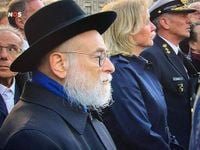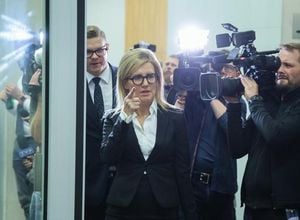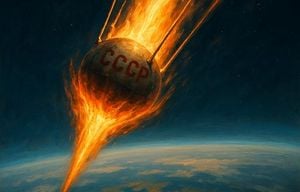In the wake of the recent Remembrance Days on May 4th and 5th, communities across the Netherlands gathered to honor those who lost their lives during World War II. The observances were marked by poignant ceremonies, touching speeches, and moments of silence, reflecting on the sacrifices made during a dark chapter in history.
On May 7, 2025, the author of this piece had the opportunity to speak to over 300 MBO students at Hoornbeeck College in Kampen, focusing on the important topic of antisemitism. The engagement was met with rapt attention, underscoring the need for continued education on this critical issue. The atmosphere was so still that one could almost hear a pin drop, a testament to the students' focus and the gravity of the subject matter.
Later that day, the author visited Urk, where the mayor warmly welcomed them via WhatsApp, assuring that the event would proceed without incident. The turnout of around 300 attendees was not surprising, but the author felt an unexpected sense of safety and belonging in Urk, a sentiment that speaks volumes about community solidarity.
The following day, on May 8, 2025, the author participated in a ceremony at the Grebbeberg military field, followed by the Amersfoort Solidarity Walk or Prayer Walk for Israel and the Jewish community. This event served as a reminder of the ongoing commitment to remember and support those affected by the atrocities of the past.
Earlier in the week, on May 3, 2025, a significant monument was unveiled in Ommen, commemorating the exterminated Jewish community. This was followed by ceremonies on May 4 at the Loenen military field and the national commemoration at Dam Square, where the nation paused to remember those who perished during the Holocaust.
On May 5, the national celebration of Liberation Day took place in Wageningen, which was marred by disruptions, highlighting the tensions that still exist in society. The author noted that the official closing of Liberation Day was held on the Amstel and in Carré, attended by the King and Queen, emphasizing the importance of these commemorative events.
In a touching act of remembrance, a young man and four friends cleaned forty 'stolpersteinen' in Utrecht on May 4, 2025. These stones serve as a memorial to the Jewish victims of the Holocaust, and their cleaning was a respectful gesture of honor for those who were lost.
Amidst these solemn observances, the author expressed concerns regarding the rising antisemitism in the Netherlands, describing it as a hijacking of the nation by agitators whose ultimate goal appears to be chaos. The author reflected on the Shoah, noting that while six million Jews were murdered, the loss of life during that period extends beyond numbers—each individual represents a story, a family, a community.
In discussing the current political climate, the author critiqued many politicians for their self-serving behavior, suggesting that this focus on personal gain undermines the collective effort needed to address societal issues. The author witnessed firsthand the verbal abuse directed at police officers who attempted to mediate a situation involving a group of young fat bikers, illustrating a broader societal challenge.
Meanwhile, Dinxperlo held a dignified Remembrance Day on May 4, 2025, organized by the VVNF, which celebrated its 55th anniversary. The day began with a special church service, followed by the unveiling of a new Names Monument that honors the citizens from Dinxperlo and De Heurne who died during the war. This monument also commemorates the fallen soldiers from the 51st Highland Division.
During the church service, Petra Veerbeek read a poignant poem by Dietrich Bonhoeffer, a German theologian and resistance fighter, who was executed by the Nazis. The service was enriched by musical performances, including a piano intermezzo and a clarinet duet that moved attendees deeply.
At the ceremony, speakers shared personal stories of loss and remembrance, including Mayor Stapelkamp, who emphasized the ongoing impact of the war and the importance of processing its legacy. The ceremony culminated in the release of doves as a symbol of peace.
On the same day, the National Remembrance Day program continued at 19:00, starting from the Dr. Jenny residential care center. The procession, accompanied by music from Lumen Folk, made its way to the Jewish monument, where Mayor Stapelkamp and council member Anna te Grotenhuis laid a wreath in honor of the Holocaust victims.
The mayor's speech addressed the complexities of the war, including the resistance and collaboration that occurred within the community. He urged continued efforts toward a democratic rule of law, European cooperation, and reconciliation with neighboring Germany, stressing respect for the sacrifices made during the struggle for freedom.
In Sevenum, the Oranje Comité is advocating for increased funding from Horst aan de Maas to ensure that Remembrance Day is observed with the respect it deserves. This highlights the ongoing commitment of communities to honor the memories of those who have passed.
As the author reflects on these events, it becomes clear that the collective memory of the Holocaust and World War II remains a vital part of Dutch society. The efforts of individuals and communities to remember, honor, and learn from the past are crucial in the fight against hatred and division in today's world. The hope is that through these acts of remembrance, society can move towards a future where respect and understanding prevail over hatred and conflict.




